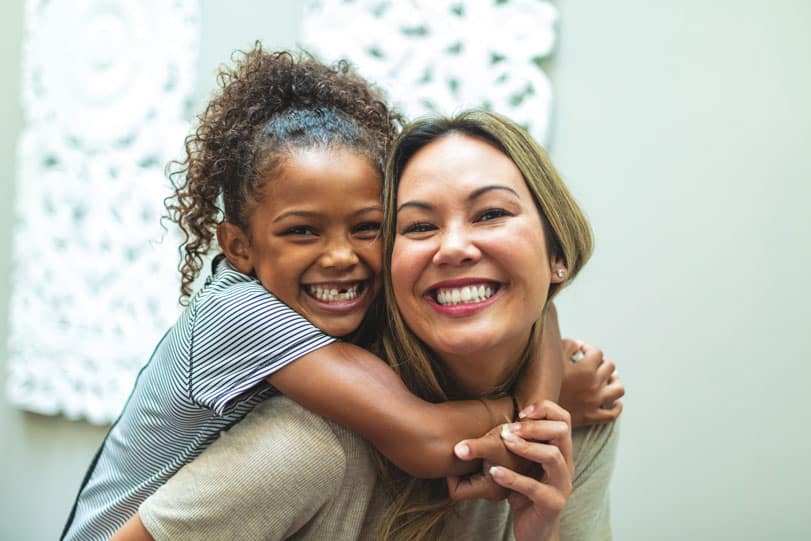One of the best ways to help children develop a passion for learning is to make it a lifelong habit. And to build a habit, experts recommend two keys: repetition and maintenance over time.[1,2]
This means that the first time a child practices a learning skill is just as important as the fifth or twentieth time. What’s important is that they practice regularly and often enough to keep the habit going.
Also, it’s important to help children develop education-based habits as soon as possible. Researchers at Brown University have found that as children age, their ability to form new habits becomes much less flexible.[9]
Parents, these 7 tips will help you support your children as they develop good learning habits. And for those who are using our school readiness program, Waterford Upstart, we’ve included additional ways to help you apply these tips to your child’s progress this year.
1. Plan brief and regular learning sessions.
When children are learning from home, it’s important to make learning sessions as regular and predictable as possible. Consistency—doing your learning at the same time and in the same way each day—will help your child know what to expect so you can get the most out of your time.
UNICEF recommends setting a goal for a learning session and working up to it.[4] If your ultimate goal is 30 minutes per session, for example, try starting with 10 minutes and working a little longer each time.
We recommend that children spend 15 minutes a day, 5 days a week using Waterford Upstart. It may not seem like a lot, but teaching children to practice learning skills regularly will go a long way.
2. Encourage your child to stay focused for the entire session.
It can be easier said than done to grab little learners’ attention for a long period of time. Try to help children avoid distractions while they work and to focus on the task in front of them. As they improve their focus, young learners will be better prepared to focus on lessons when they enter the classroom.
To help children stay organized while they learn, KidsHealth suggests making a to-do list at the beginning of the day or learning session.[5] That way, your child knows what they need to get done and can work on what needs their attention most.
 3. Set up a space in your home dedicated to learning.
3. Set up a space in your home dedicated to learning.
Giving your child a specific area in your home where they practice learning skills can lead to better focus and motivation. It also teaches children that education is a priority for everyone in your home.
Choose an area in your home that is quiet and free of distractions. Then, help your child set up everything they need to get working. Encourage them to practice in this learning space every day to help them make it a habit.
4. Allow for some flexibility in your child’s learning.
It’s helpful to have your child practice for a similar amount of time each day so they can develop their own routine. But a home learning routine must be able to fit into your family’s schedule for it to stick.[3]
If something comes up during the day that interferes with your regular Waterford Upstart schedule, that’s okay! Just adjust your schedule to fit it in at a time that works best for your family.
5. Engage with your child through the lesson.
According to the World Health Organization, children learn better when their parents interact with and support them through it.[6] Pay attention to your child while they’re working on their assignments and provide help or support as needed.
When using Waterford Upstart, it’s okay to encourage your child if they feel stuck. However, avoid hinting at or telling them the correct answer. The program will work best if it gets a real picture of your child’s unique strengths and weaknesses.
6. Apply what your child is learning to everyday life.
One powerful way to help your child’s learning is to connect it to the world around them. Encourage your child to practice their new skills in everyday situations. For example, you can read recipes, road signs, and grocery receipts together to make reading a habit.[7]
Pay attention to what your child is currently learning in Waterford Upstart. When a situation arises that relates to a recent lesson, see if you can quiz your child to practice the concept.
7. Guide your child back to the task if they get distracted.
Even the hardest-working students are sometimes distracted. If your child has trouble focusing, try not to criticize or punish them. Instead, remind them that right now is their time to focus on learning and help them with their task as needed.
In an article with Edutopia, educational researcher Youki Terada suggests using regular, short breaks to help children focus and feel less stressed.[10] If your child seems overwhelmed about a lesson, suggest that they take a 10- to 15-minute break and come back to it when they’re feeling better.
Sources:
- Rothman, A. J. Toward a theory-based analysis of behavioral maintenance. Health Psychology, 19(1), 2000, pp. 64–69.
- Lally, P., Van Jaarsveld, C.H.M., Potts, H.W.W., and Wardle, J. How are habits formed: Modelling habit formation in the real world. European Journal of Social Psychology, October 2010, 40(6), pp. 998-1009.
- Center for Disease Control and Prevention. Help Children Learn: Keep Children Learning While School’s Out. https://www.cdc.gov/coronavirus/2019-ncov/daily-life-coping/children/learning.html.
- Jenkins, R. 5 ways to help keep children learning during the COVID-19 pandemic. UNICEF, Aug. 2020. https://www.unicef.org/coronavirus/5-tips-help-keep-children-learning-during-covid-19-pandemic
- Hoffses, K. 10 Ways to Help Your Child Succeed in Elementary School. Kids Health, Aug. 2018.https://kidshealth.org/en/parents/school-help-elementary.html.
- World Health Organization. Helping children learn, be happy and thrive. https://www.who.int/news-room/feature-stories/detail/helping-children-learn-be-happy-and-thrive.
- Morin, A. 8 Tips to Help Young Kids Develop Good Reading Habits. Understood. https://www.understood.org/en/school-learning/learning-at-home/encouraging-reading-writing/8-tips-to-help-young-kids-develop-good-reading-habits
- Mississippi Department of Education. Ten Tips for Learning at Home. https://www.mdek12.org/sites/default/files/Offices/MDE/OAE/OEER/Learning%20at%20Home/ten_tips_for_parents.pdf
- Pressman, R.M., Owns, J.A., Evans, A.S., and Nemon, M.L. Examining the Interface of Family and Personal Traits, Media, and Academic Imperatives Using the Learning Habit Study. The American Journal of Family Therapy, 2014, 42(5), pp. 347-363.
- Terada, Y. Research-Tested Benefits of Breaks. Edutopia, March 2018. https://www.edutopia.org/article/research-tested-benefits-breaks.

